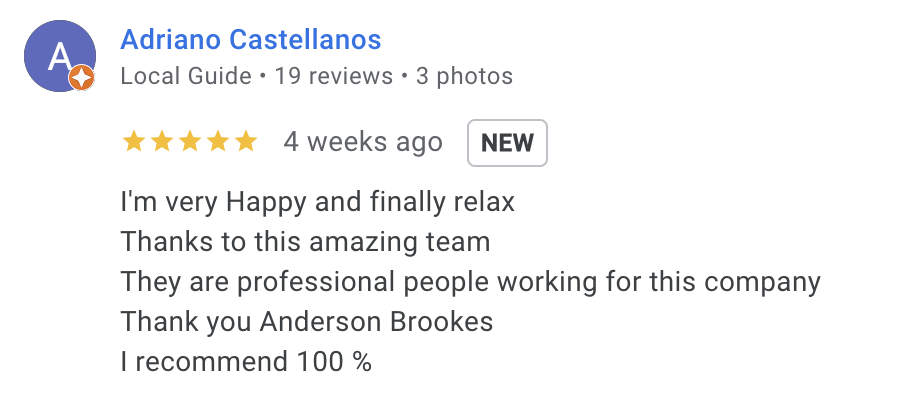Wind up a company with debt
Closing a Limited Company with Debts?
Do It Quickly and Properly
Licensed Insolvency Practitioners for Directors and Business Owners
Free Advice & Same Day Quote
Fast, Affordable, and Stress-Free Solutions.
How to Close Your Limited Company – Even If It Has Debts

Directors: Avoid Risks When Winding Up Your Company - We Handle Everything
If you're thinking, “I just want to close my company”, you're not alone. At Anderson Brookes, we help directors close or wind up limited companies quickly, legally, and affordably - often within 8 days. Whether you’re dealing with unpaid debts, creditor threats, or struggling to keep your business afloat, we’re here to guide you every step of the way.
Testimonials
Our clients praise our professionalism, reliability, and the exceptional support we provide during challenging times, helping thousands of company directors through insolvency, liquidation, and business debt solutions.
Sectors We Support
We support company directors in every sector, from construction firms and logistics companies to pubs, cafés, restaurants, hotels, retailers and manufacturers. Our advice is always clear, confidential and shaped by real experience in your industry. Whether you’re dealing with unpaid tax, supplier pressure or falling income, our team understands the challenges and will guide you through the best next steps.
Frequently Asked Questions
Have a company in England or Wales? These are your limited company business debt, liquidation and insolvency questions answered.
Can I liquidate the company myself?
No. Only a Licensed Insolvency Practitioner can place a company into liquidation.
What are the advantages of liquidation?
Placing the company into liquidation will stop debt enforcement, including bailiff action. The directors are usually in control of the process and can choose the liquidator. In most cases, it can be completed within two weeks without needing to attend any formal meetings. Company debts are usually written off unless they are personally guaranteed. Directors who act responsibly can show they handled the company’s financial affairs properly.
Is liquidation the same as dissolving the company?
No. Only a Licensed Insolvency Practitioner can liquidate a company. A director can apply to dissolve a company through Companies House, but only if certain conditions are met. If the company is insolvent, it may be a criminal offence to apply for strike-off. Always take professional advice before doing this. If you think you might qualify for dissolution, call us and we’ll explain the process. See our Licensed vs Unregulated page.
What is compulsory liquidation?
This happens when a creditor applies to court to wind up a company due to non-payment of a debt over £750. If the court agrees, the company is placed into compulsory liquidation. This often leads to more problems for directors, who may find it harder to defend against accusations such as wrongful trading. It is usually better to start the process voluntarily. See Strike Off vs Voluntary Liquidation for more details.
How much will it cost to liquidate my company?
It depends on your situation. In most cases, the directors do not pay the costs personally. The liquidation is paid for using company assets. We are a small practice based in Bolton with low overheads, so we offer some of the most competitive fees in the UK. All costs will be confirmed in writing before we proceed. You may also be interested in CVL Costs.
What is a phoenix company?
This is a new limited company that starts after an old one has gone into liquidation. It allows the business to carry on with the profitable parts of the original company. There are strict rules about reusing a company name, so it’s important to get advice before going ahead. For further detail and more simple explanations of insolvency and liquidation terms see our Glossary.
What is a Members’ Voluntary Liquidation (MVL)?
An MVL is used when a company is still solvent and can repay all its debts. It may be the right option if directors want to retire or step away from the business. MVLs can offer tax benefits, but they must be handled by a Licensed Insolvency Practitioner. See all types of liquidations.
What is wrongful trading?
If a company is insolvent and directors carry on trading, they may be accused of wrongful trading. A director could be held personally liable if they knew, or should have known, that the company couldn’t avoid liquidation and did not act to reduce losses. Acting early helps reduce this risk.
Do you only offer formal insolvency advice?
No. Many businesses contact us who do not need formal insolvency procedures. We help explore all the options, including self-help and informal solutions. If formal action is needed, our Licensed Insolvency Practitioner can act for you directly.
Closing a Limited Company with Debts?
Fast and Stress-Free Solutions.
Start closing your limited company today. Placed into liquidation within 8 days. We fully understand that timing is critical.
Worried about your Bounce Back Loan?
Need to close your limited company? Speak to an expert who’s helped thousands do the same – even with company debts or creditor pressure.
Stop Creditor Pressure
Getting constant calls from creditors? Closing your company through liquidation can give you the relief to move forward.
Directors: Avoid Risks When Winding Up Your Company
We guide you, simply, honestly. Let us handle everything.
"I Want To Close My Company"
“I just want to close my company” – we are here to help. At Anderson Brookes, we help directors take fast, legal steps to wind up limited companies, usually within 8 days.
How do I close my limited company?
It depends on whether your company has debts.
If your company has no debts and hasn’t traded for three months, you may be able to apply for voluntary strike-off through Companies House.
If your company has debts or owes HMRC, a Creditors’ Voluntary Liquidation (CVL) is usually the best route. This is a legal process led by our licensed insolvency practitioner, where debts are written off and the company is closed in an orderly way. We need to check this is an option for you.
We’ll help you understand the best option for your circumstances.
Can I still close my company if it has debts?
Yes. If your business owes money – including loans, unpaid tax, or suppliers – liquidation is often the safest and cleanest way to close it. At Anderson Brookes, we’ll deal with your creditors on your behalf and guide you through the process from start to finish. It’s designed to give directors peace of mind and a fresh start.
How long does it take to wind up a company?
We can start the process immediately and, in most cases, place your company into liquidation within 8 days. Timing matters – if creditors are threatening action or bailiffs have been instructed, fast intervention can protect you and the business. The sooner you speak to us, the more options you’ll have.
Can I use Companies House to close my company?
You can only use the Companies House strike-off route if your company:
Hasn’t traded for 3 months
Has no debts or legal disputes
Has settled all outstanding tax
If any money is owed, even to HMRC, strike-off is likely to be rejected or challenged. In that case, a formal liquidation is the proper route, and we can help you do that quickly and correctly.
What’s the difference between striking off and liquidation?
Striking off is a simple administrative process, suitable only for dormant, debt-free companies.
Liquidation is a formal insolvency procedure for companies that:
- Have debts
- Can’t afford to pay their bills
- Are no longer viable
A CVL allows you to close the company lawfully, end all business activity, and write off any unsecured debts. It also offers legal protection from further creditor action.
What’s the Best Way to Close a Limited Company with Debts?
The most effective way is a Creditors’ Voluntary Liquidation (CVL), especially if you have company debts. This is a formal process led by a licensed insolvency practitioner. At Anderson Brookes, we help directors close their limited companies quickly and legally – giving peace of mind and stopping creditor action.
Ready to Close Your Company?
We’re here to help you move on without judgment, pressure, or delay. If you’re ready to take control, start the process today.
☎️ Call us now: 0800 1804 934
📧 Email: advice@andersonbrookes.co.uk
I just want to close my company – where do I start?
Start by speaking with our experienced team. We’ll provide free, confidential advice based on your situation. No jargon. No pressure. Just straight-talking guidance to help you move forward.
You can call us now on 0800 1804 934, request a quote online, or fill in the short form on this page – and we’ll be in touch right away.
What happens to my Bounce Back Loan if I liquidate?
Bounce Back Loans are treated like any other unsecured debt in liquidation – they’re written off as part of the process. You won’t be held personally liable if the loan was used correctly and there was no wrongdoing.
We’ve helped thousands of directors close companies and we’ll explain exactly what you need to know.
Will I have to pay anything personally?
In most cases, directors are not personally liable for company debts, especially when they’ve acted properly and taken advice. As licensed insolvency practitioners, our role is to protect you and ensure everything is done by the book.
We’ll explain your responsibilities clearly and flag anything you need to be aware of, including personal guarantees or overdrawn director’s loans.




© 2026 All Rights Reserved.
Anderson Brookes Insolvency Practitioners Ltd operate a complaints procedure. In the first instance, please call 01204 255 051 or email info@andersonbrookes.co.uk to request a copy of the complaints process. Legal and Regulatory statements are available on this site. If we are unable to deal with your complaint to your satisfaction, your complaint should be made to the Insolvency Complaints Gateway by visiting their website https://www.gov.uk/complain-about-insolvency-practitioner and completing and submitting their online form. Alternatively, you can print the form from their website and send it by post to The Insolvency Service, IP Complaints, 3rd Floor, 1 City Walk, Leeds, LS11 9DA or contact them by telephone on 0300 678 0015 (Monday to Friday 9am – 5pm).
